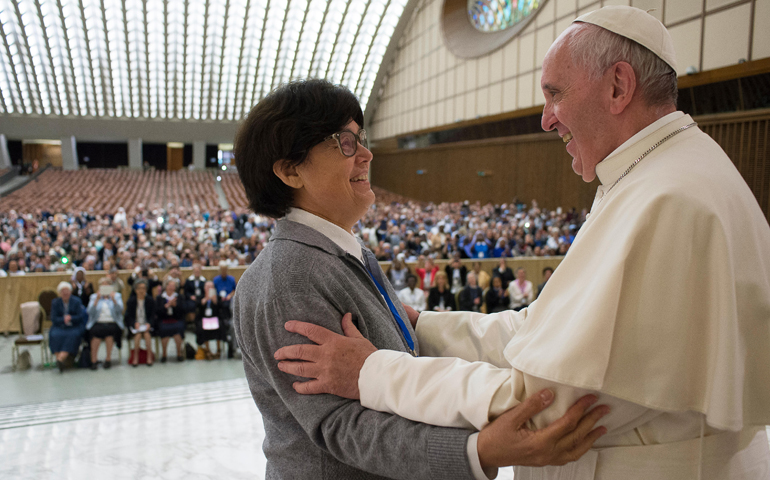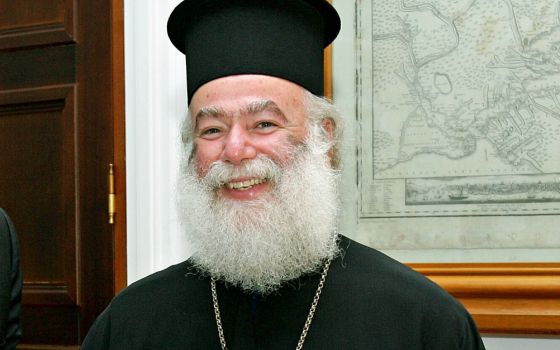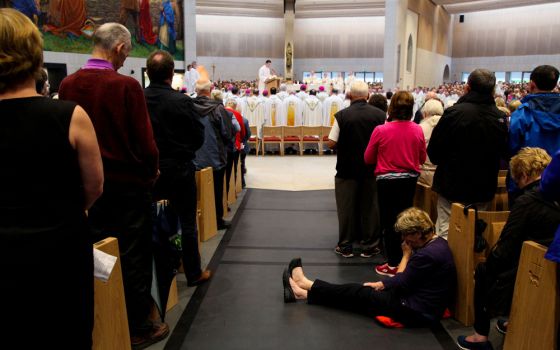
Pope Francis greets Sister Carmen Sammut, president of the International Union of Superiors General, during an audience with the heads of women's religious orders in Paul VI hall at the Vatican May 12. During a question-and-answer session with members of the UISG, the pope said he was willing to establish a commission to study whether women could serve as deacons. (CNS/L'Osservatore Romano)
Pope Francis named just one woman from the Western Hemisphere to his commission on women deacons.
That would be me.
So, what happens next? Fact is, I do not know. I assume at some point in the not-too-distant future, I will receive an invitation to go to Rome to meet with the other commissioners. Our mandate is to study women in the diaconate.
When he spoke to the members of the Union of International Superiors General in Rome on May 12, the Holy Father said he was especially interested in the women deacons of the early church. He said he would ask the Congregation for the Doctrine of the Faith what it had on the matter and, yes, at the sisters' request, he would form a commission.
I wonder what the doctrinal congregation sent. I wonder if it sent along the 1997 International Theological Commission report that found no barrier to women deacons. I understand the report was printed, numbered and readied for the International Theological Commission president's signature, but he refused to sign it. It was not published.
At the time, the International Theological Commission president and the Congregation for the Doctrine of the Faith prefect was Cardinal Joseph Ratzinger.
I don't think we should groan too much. I actually wonder if, nineteen years ago, there was wisdom in Cardinal Ratzinger's decision. The diaconate, restored as a permanent vocation, was only thirty years old then, still almost in its experimental and exploratory stages.
It took quite a while for many episcopal conferences to answer the Second Vatican Council's call to restore the diaconate as a permanent vocation. While many U.S. bishops began ordaining married men as deacons nearly as soon as they could, others did not jump in quickly. For example, it took nearly forty years for dioceses in the United Kingdom and Ireland to begin training deacons. Even so, the diaconate grew. There are now more than 42,000 deacons worldwide, largely concentrated in Western Europe and the United States.
Theory about the diaconate also grew, in keeping with its spread around the world. Paulist Press led the way in the United States with many books by and about deacons. I raised my hand and voice often to ask about restoring women to diaconal ministry.
By 2002, a new International Theological Commission committee, headed by a former graduate student of Ratzinger, completed a study document concluding that "the ministry of discernment, which the Lord left his Church" should decide the question of women deacons.
The 2002 International Theological Commission study depends heavily on the work of one scholar, Aimé Georges Martimort (1911-2000), who strongly opposed returning women to the diaconate in his 1982 book (translated to English in 1986), Deaconesses: An Historical Study. In 2002, the International Theological Commission seemed to agree with Martimort, but included his determination that the question of women in the diaconate was unresolved.
In the years since, other scholars have looked at the question, have retranslated studies and original documents, and have questioned why only half the diaconate has been rejuvenated so far.
Now, in 2016, the ministry of discernment about women in the diaconate has been handed over to twelve scholars under the presidency of another scholar, a Jesuit professor of dogmatic theology who is also the doctrinal congregation's secretary. And so the commission will meet, discern, and one hopes, decide on a recommendation.
Outside the commission meetings, the larger ministry of discernment is already moving along. The usual suspects are criticizing the pope and his commission, one even blogging about "deaconettes" while fomenting insurrection, if not schism. Others either raise false hopes about women priests, or fight the paper tiger that suggestion represents.
Despite the frayed edges of the conversation, I think it is important for the church -- the whole church -- to think and pray about women deacons. Were they ordained in ceremonies identical to those used for men? Yes. Was that always the case? Who knows? Did their ordination ceremonies include the epiclesis -- the calling down of the Holy Spirit -- and the laying on of hands? Yes. Did they have the same tasks and duties as men deacons? No. They had some. But neither did men deacons share their tasks and duties, including anointing ill women and those newly baptized. History alone cannot decide this. One hopes the Holy Spirit is in the details.
I cannot tell you how things will be resolved, or when. I can only say that it appears Pope Francis will make a decision. I genuinely believe his decision, whatever it is, will be the right one.
[Phyllis Zagano is senior research associate-in-residence at Hofstra University in Hempstead, N.Y. She is scheduled to speak Sept. 24, 2016, at The Catholic University of America, Washington, D.C. and October 19, 2016 at Sacred Heart University, Fairfield, Conn. Her books include Women Deacons: Past, Present, Future, Women Deacons? Essays with Answers and In the Image of Christ: Essays on Being Catholic and Female.]
Editor's note: We can send you an email alert every time Phyllis Zagano's column, Just Catholic, is posted. Go to this page and follow directions: Email alert sign-up.


